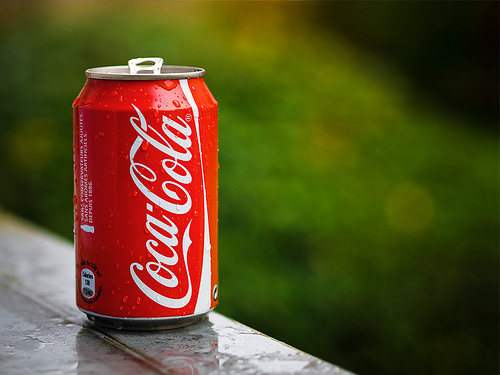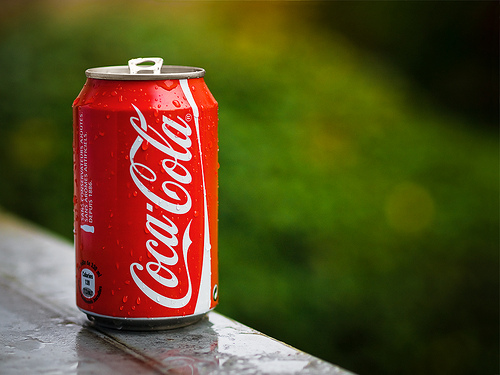 Don’t drink the Coca-Cola Kool-AidPhoto: Oleg Sklyanchuk“Coca-Cola goes green,” announced a 2010 Forbes article. Indeed, the beverages giant maintains partnerships with Big Green groups like Conservation International and World Wildlife Fund. It recently even completed its takeover of Honest Tea, an organic bottled-tea company. It would clearly like to be seen as a paragon of “green capitalism” — the idea that doing good and doing well go hand in hand.
Don’t drink the Coca-Cola Kool-AidPhoto: Oleg Sklyanchuk“Coca-Cola goes green,” announced a 2010 Forbes article. Indeed, the beverages giant maintains partnerships with Big Green groups like Conservation International and World Wildlife Fund. It recently even completed its takeover of Honest Tea, an organic bottled-tea company. It would clearly like to be seen as a paragon of “green capitalism” — the idea that doing good and doing well go hand in hand.
Let’s put aside questions over what can possibly be “green” about a business model geared to sucking in huge amounts of drinking water, blasting it with what are probably toxic sweeteners and other dodgy substances, and then packaging it in little aluminum cans and plastic bottles and sending them far and wide, to be chilled (using fossil energy) before consumption.
OK, so within those tight constraints, Coca-Cola says it wants to be a “green company.” So … WTF? Last week, Coca-Cola shareholders voted by a 3-to-1 margin to continue using BPA, a toxic industrial chemical, in the lining of its soft-drink cans.
According to an account in Food Production Daily, a company executive assured shareholders that “if we had any sliver of doubt about the safety of our packaging, we would not continue to use [BPA].” So, we’re supposed to believe that Coke execs have weighed the evidence and found BPA to be safe — and that they will immediately banish it if they decide otherwise.
Sorry, but that’s bullsh*t. Here’s how Scientific American recently described BPA: “In recent years dozens of scientists around the globe have linked BPA to myriad health effects in rodents: mammary and prostate cancer, genital defects in males, early onset of puberty in females, obesity, and even behavior problems such as attention-deficit hyperactivity disorder.” To that list of maladies, we can add reduced sperm count and sexual function in human males.
The weight of evidence keeps growing. Over the weekend, a study presented at the Pediatric Academic Societies annual meeting linked BPA exposure among pregnant mothers to heightened risk of childhood asthma in babies.
If Coke’s safety rationale isn’t credible, a statement on Coke’s corporate website (quoted in Food Production Daily) suggests another motivation for clinging to the industrial poison:
We are working with third-parties that produce can liners to explore possibilities that include alternatives to liners with BPA. Currently, the only commercially viable lining systems for the mass production of aluminium beverage cans contain BPA.
“Commercially viabile” is the key phrase here. What the company seems to be saying is that it doesn’t want to pony up to pay more for BPA-free cans. That’s a shame. If large-scale “green capitalism” has any worth, it’s in the fact that large players have the power to move markets. True, BPA-free cans might be expensive now, but if Coke switched over, the price wouldn’t stay high for long. Ridding beverage cans of BPA would require a short-term profit hit, but would bring long-term benefits to society as a whole. Evidently, Coke execs, and a majority of the shareholders on behalf of whom they maximize profit, have decided the short-term hit isn’t worth the trouble.
And here is where we slam against the limits of “green capitalism.” We cannot rely on corporations to sacrifice profit on behalf of public health. We need independent, risk-based regulation of toxic substances — precisely the purpose the EPA was created for. But as shown in a paper just published in Environmental Health (available as a PDF starting May 5), the EPA’s process for regulating industrial chemicals is hopelessly inadequate and outdated.
Meanwhile, the agency responsible for keeping toxic chemicals out of the food supply, the FDA, has been craven on this issue. In 2010, the FDA took a singularly maddening position on the stuff, as Tom Laskawy reported for Grist. On the one hand, after years of denying mounting evidence that BPA posed serious health risks, the agency declared it had “some concern about the potential effects of BPA on the brain, behavior, and prostate gland in fetuses, infants, and young children.”
On the other, the agency has essentially claimed it is unable to ban it from use. “Today there exist hundreds of different formulations for BPA-containing epoxy linings, which have varying characteristics,” and food companies aren’t obligated to declare which ones they’re using, the agency complained in its January statement. “If FDA were to decide to revoke one or more approved uses, FDA would need to undertake what could be a lengthy process of rulemaking to accomplish this goal,” the agency declared, referring to itself in the third person. In other words, the poison has been distilled into so many forms that it would take a lot of work to keep it out of food processing. And rather than initiate that process, FDA chose to sit on its hands — meaning that the food industry still knowingly exposes millions of people every day to a chemical the FDA acknowledges is harmful.
Business-press puff pieces and breathless press releases aside, “green capitalism,” in the absence of oversight, is just another marketing campaign.



